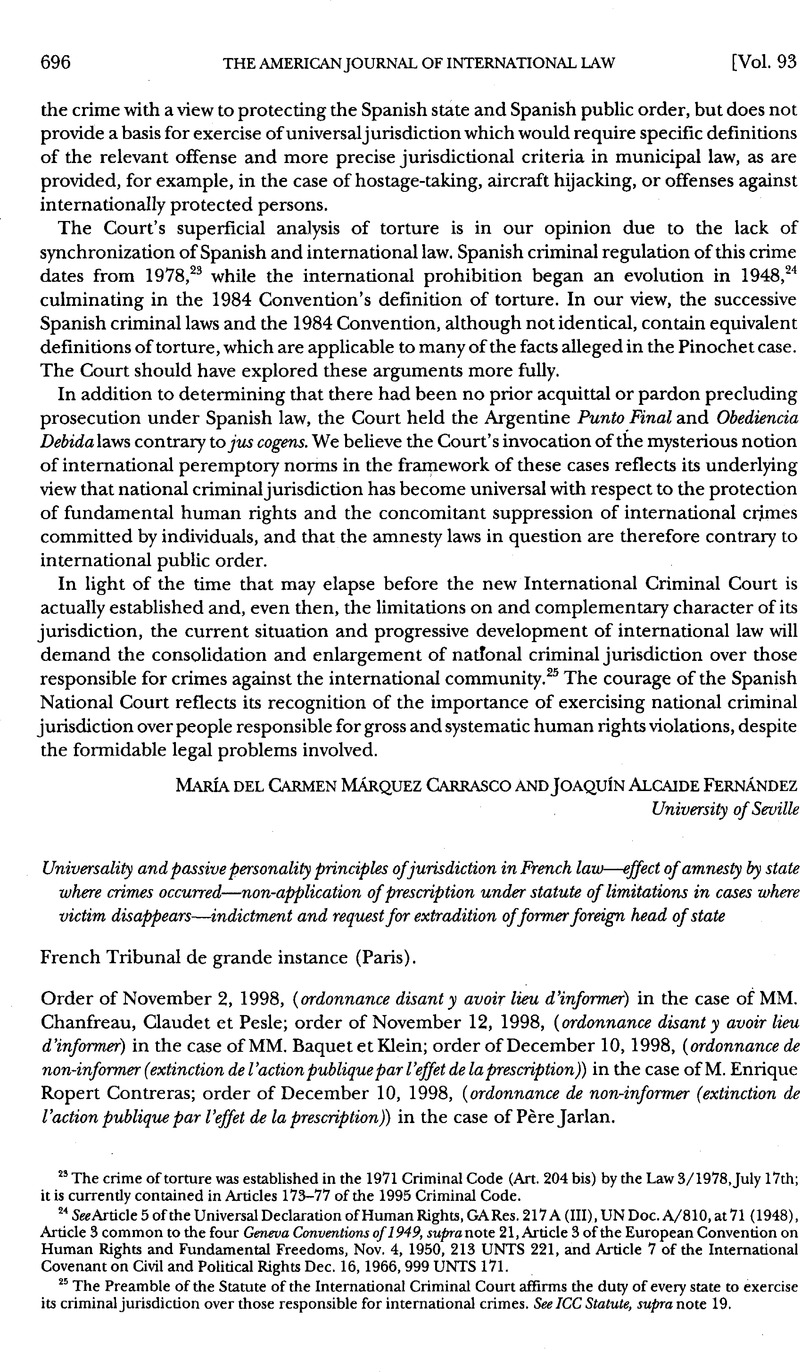Published online by Cambridge University Press: 27 February 2017

1 A report on the Spanish proceedings appears suprap. 690.
2 On file with the author.
3 Since the decisions in the Pinochet case, on January 6, 1999, three complaints were filed in the French courts by two Cuban nationals and one French national against Fidel Castro for crimes against humanity and drug trafficking. Alain Abelard, Trois plaintes contre Fidel Castro ont été déposées aupres des tribunaux français, Le Monde, Jan. 8, 1999, at 5. On February 26, 1999, Judge Hervé Stephan issued an “Ordonnance de non-informer” declining to proceed. See Alain Abelard, Les plaintes déposées contre Fidel Castro ne seront pas instruites, Le Monde, Feb. 29–Mar.1, 1999, at 4.
4 Pursuant to the principle of opportunités des poursuites, the Prosecutor decides whether it is appropriate to prosecute the case. If the Prosecutor receives a complaint and decides to commence a public prosecution (“action publique”), he opens an instruction, in other words, decides that the facts should be investigated by a juge d’instruction (examining magistrate). The victim’s complaint may be accompanied by a constitution de partie civile joining a request for civil remedies to the criminal action. The criminal and civil actions may not be tried separately before two different courts.
5 See the author’s reports on the Bosnia and Rwanda cases in 93 AJIL 525 (1999).
6 Convention on the Prevention and Punishment of Genocide, Dec. 9, 1948, 78 UNTS 277.
7 Brigitte Stern, Les moyens d’oser, Le Monde, Oct. 29, 1998, at 19. The report on the Spanish proceedings in this section suggests that the unusual history of the definition of genocide in Spanish legislation and jurisdictional constraints in Spanish law may have influenced the characterization of die offenses as genocide by the Spanish courts.
8 Pinochet was President of the military junta from September 11, 1973, to June 26, 1974, and thereafter President of Chile until March 11, 1990. The provision contained in Article 211–12 of the Penal Code making crimes against humanity a separate offense under French penal law entered into force on March 1, 1994. See C. Pén. Art. 211–12 (Fr.).
9 Pursuant to the Nuremberg Charter, prosecutions were conducted in France against Barbie, Cass, crim., Dec. 20, 1985, [1985] Bull. Crim., no. 7, at 1038; [1986] JCP II. 20655 and Cass, crim., June 3, 1988, [1988] Bull. Crim., no. 1, at 637; Touvier, Cass, crim., Feb. 6, 1975, [1975] D. J. Jur. 386., [1975] Bull. Crim., no. 42, at 113, and Papon, CA, Bordeaux, Feb. 2, 1998, available at <>, (presently under review by the Cour de cassation).
10 That law provided for the non-applicability of statutes of limitation to crimes against humanity as defined in die Nuremberg Charter (author’s note).
11 Cass, crim., Apr. 1, 1993, Gaz. Pal. 1993, 281.
12 For example, the 1949 Geneva Conventions require municipal legislation penalizing grave breaches and do not directly create crimes under French law, even if the language used suggests that it creates self-executing universal jurisdiction. See 75 UNTS 31; 75 UNTS 85; 75 UNTS 135; 75 UNTS 287.
13 Ordonnance de non-informer (Extinction de l’action publique par l’effet de la prescription) (on file with the author). The same decision was taken in the case of Père Jarlan.
14 It might be successfully argued on appeal from this decision that as long as Pinochet was in Chile and protected by his position and by the amnesty law, it would have been senseless to try a prosecution in France, and that therefore no effective remedy existed.
15 Mr. Bourdon is also an official of the Fédération intemationale des droits de I’homme.
16 As noted by Louis Joinet, avocat général à, la Cour de cassation and an expert at the United Nations Commission on Human Rights, “it would be a major step forward if the crime of forced disappearance were not prescribed after 10 years.” Louis Joinet, L’affaire Pinochet relance le débat sur le jugement des crimes contre l’humanité, Le Monde, Nov. 21, 1998, at 2.
17 “Acts constituting enforced disappearance shall be considered as a continuing offense as long as the perpetrators continue to conceal the fate and the whereabouts of persons who have disappeared and these facts remain unclarified.” Art. 17(1), GA Res. 47/133, (Dec. 1, 1992).
18 Order declaring that an inquiry has to be conducted on the complaints of the plaintiffs, Dec. 2, 1998, (on file with the author).